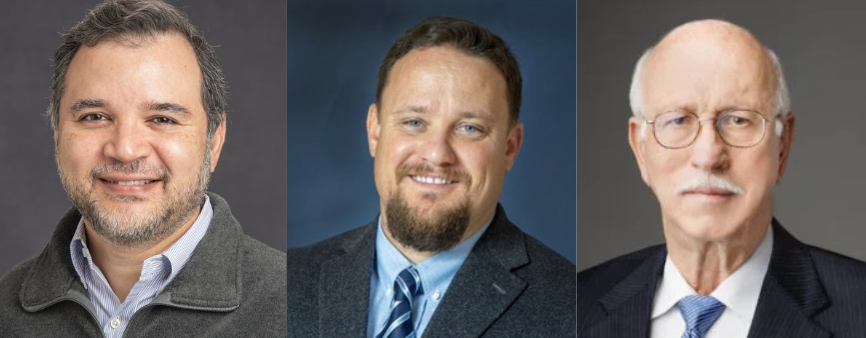
CREATE affiliated researchers have received a 2-year grant from the National Science Foundation Program on Humans, the Disasters, and the Built Environment (HDBE). The grant, “Advanced Data and Methods to Improve Hazard Resilience for Underrepresented Groups: Minority- and Women-Owned Small and Mid-Sized Businesses” engages three generations of CREATE-affiliated researchers, including Co-PI Adam Rose (CREATE Senior Research Fellow and Director Emeritus; Research Professor in the Price School of Public Policy).
The project is led by PI Alfredo Roa-Henriquez (Assistant Professor of Supply Chain Management, North Dakota State University). Noah Dormady (CREATE Research Fellow; Associate Professor in Ohio State’s John Glenn College of Public Affairs; PhD grad of the Price School under the mentorship of Rose), is also a co-PI. Dr. Roa-Henriquez was mentored by Dr. Dormady in his PhD studies at Ohio State.
The senior research team also includes Co-PI Maria Watson (Assistant Professor School of Construction Management, University of Florida). The researchers will collaborate with scholars at the Kyoto University Disaster Prevention Research Institute (DPRI), one of the leading research centers in Japan focusing on natural disasters.
This project brings together a binational team of experts in hazard resilience science and economics to gather and analyze novel data to improve understanding of how small and mid-sized enterprises (SMEs) rebound and recover from catastrophic events by improving their resilience capacity. This team will investigate the antecedents of SME resilience and recovery, with a focus on at-risk minority- and women-owned and operated firms. The team will: a) map resilience to microeconomic theory, b) integrate theoretical advancements with observational data collection, c) utilize statistical and econometric analysis to quantify resilience and recovery, and d) use survey and statistical controls to quantify resilience metrics and improve resilience actions to improve disaster recovery. The research will engage diverse communities and diverse resilience activities and outcomes voiced by those communities.
This research will help reduce hazard vulnerability and improve the resilience capabilities of minority- and women-owned businesses. The project will identify ways to enhance resilience processes by improving the timing of resilience investments in repair and reconstruction and protection against future disasters, including investigation of best practices and obstacles to recovery. It will also help federal, state and local agencies improve policy design.
The application to SMEs owned and operated by underrepresented groups will also improve equity and social justice with regard to the disproportionate consequences of natural disasters, insurance and the disbursement of government assistance. Ultimately, the project aims to improve the utilization of government assistance reduce insurance costs through resilience. Finally, the project advances Sendai Framework areas #3 (optimal resilience investment) and #4 (capability-enhancing investments that ‘build back better’). It also addresses areas #1 (vulnerability reduction) and #2 (improved decision making and governance).
This project builds on 20 years of research on economic resilience at CREATE, including resilience principles, tactics based on economic production theory, extensive survey research, econometric analysis, and numerous studies of the total economic impacts of resilience for such cases as the 2001 World Trade Center Attacks, earthquakes, floods, cyber-attacks, and COVID-19.
Selected References:
- Watson, M., C. Brown, J. Handmer, C. Kroll, A. Wein, J. Helgeson, A. Rose, N. Dormady, and J. Kim. 2023. “Methods and Lessons for Business Resilience and Recovery Surveys,” International Journal of Disaster Risk Reduction 93: 103743. https://authors.elsevier.com/c/1h7-T7t2zZDOry
- Walmsley, T. A. Rose, R. John, D. Wei, J. Hlávka, J. Machado, and K. Byrd. 2023. “Macroeconomic Consequences of the COVID-19 Pandemic,” Economic Modelling 120: 106147. https://doi.org/10.1016/j.econmod.2022.106147
- Dormady, N., A. Rose, C. B. Morin and A. Roa-Henriquez. 2022. “The Cost-Effectiveness of Economic Resilience,” International Journal of Production Economics 244: 108371. https://doi.org/10.1016/j.ijpe.2021.108371
- Wei, D., A. Rose, Koc, E., Z. Chen, and L. Soibelman. 2022. “Socioeconomic Impacts of Resilience to Seaport and Highway Transportation Network Disruption,” Transportation Research D 106: 103236. https://doi.org/10.1016/j.trd.2022.103236
- Weaver, G., B. Feddersen, L. Marla, D. Wei, A. Rose, and M. Van Moer. 2022. “Estimating Economic Losses from Cyber-Attacks on Shipping Ports: An Optimization-Based Approach,” Transportation Research C 137: 103423. https://doi.org/10.1016/j.trc.2021.103423
- Dormady, N., A. Rose and C.B. Morin. 2022. “Advances in the Empirical Estimation of Disaster Resilience,” in M. Skidmore (ed.). Handbook of Disasters, Cheltenham, UK: Edward Elgar, pp. 401-28. https://books.google.com/books?id=u2-VEAAAQBAJ&newbks=0&printsec=frontcover&pg=PA401&hl=en&source=newbks_fb#v=onepage&q&f=false
- Rose, A. and Z. Chen. 2020. “Resilience to a Cyber-Attack on the Detroit Automobile Industry: A Computable General Equilibrium Approach,” in P. Nijkamp, E. Glaeser and K. Kourtit (eds.), Urban Empires, Heidelberg: Springer, pp. 377-94. https://www.taylorfrancis.com/chapters/edit/10.4324/9780429469978-25/resilience-cyber-attack-detroit-automobile-industry-adam-rose-zhenhua-chen
- Rose, A. and N. Dormady. 2018. “Advances in Analyzing and Measuring Dynamic Economic Resilience,” in B. Trump, M. Florin and I. Linkov (eds.). IRGC Resource Guide on Resilience (vol. 2): Domains of Resilience for Complex Interconnected Systems. Lausanne, CH: EPFL International Risk Governance Center. https://beta.irgc.org/wp-content/uploads/2018/12/Rose-et-al-for-IRGC-Resilience-Guide-Vol-2-2018.pdf
- Rose, A. 2017. Defining and Measuring Economic Resilience from a Societal, Environmental and Security Perspective. Singapore: Springer. https://doi.org/10.1007/978-981-10-1533-5
- Rose, A., I. Sue Wing, D. Wei, and A. Wein. 2016. “Economic Impacts of a California Tsunami,” Natural Hazards Review 17(2): 04016002. https://doi.org/10.1061/(ASCE)NH.1527-6996.0000212
- Rose, A. and E. Krausmann. 2013. “An Economic Framework for the Development of a Resilience Index for Business Recovery,” International Journal of Disaster Risk Reduction 5: 73-83. https://doi.org/10.1016/j.ijdrr.2013.08.003
- Rose, A., G. Oladosu, B. Lee, and G. Beeler Asay. 2009. “The Economic Impacts of the 2001 Terrorist Attacks on the World Trade Center: A Computable General Equilibrium Analysis,” Peace Economics, Peace Science, and Public Policy 15(2): Article 6. https://doi.org/10.2202/1554-8597.1161
- Rose, A., G. Oladosu, and S. Liao. 2007. “Business Interruption Impacts of a Terrorist Attack on the Electric Power System of Los Angeles: Customer Resilience to a Total Blackout,” Risk Analysis 27(3): 513-31. https://doi.org/10.1111/j.1539-6924.2007.00912.x
- Rose, A. 2007. “Economic Resilience to Disasters: Multidisciplinary Origins and Contextual Dimensions,” Environmental Hazards: Human and Social Dimensions 7(4): 383-98. https://doi.org/10.1016/j.envhaz.2007.10.001
- Rose, A. and S. Liao. 2005. “Modeling Regional Economic Resilience to Disasters: A Computable General Equilibrium Analysis of Water Service Disruptions,” Journal of Regional Science 45(1): 75-112. https://doi.org/10.1111/j.0022-4146.2005.00365.x
Posted July 1, 2024
